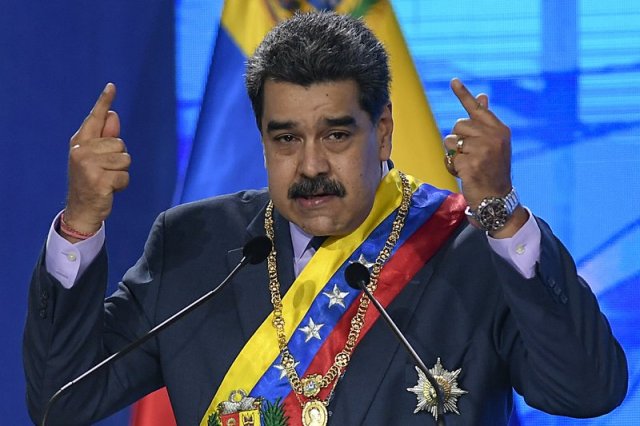
A Colombian businessman was carrying a letter from Venezuelan President Nicolas Maduro accrediting him to Iran’s supreme leader when he was arrested on a U.S. warrant last year, according to a new court filing in a politically charged corruption case ratcheting up tensions with the South American nation.
Attorneys for Alex Saab made the filing in Miami federal court Thursday just hours after prosecutors in the African nation of Cape Verde said they granted the 49-year-old Colombian house arrest as he fights extradition to the U.S. to face money laundering charges.
U.S. officials believe Saab holds numerous secrets about how Maduro, his family and top aides allegedly siphoned off millions of dollars in government contracts amid widespread hunger in the oil-rich nation. He was detained last June when his jet made a refueling stop on a flight to Tehran, where he was allegedly sent to negotiate deals to exchange Venezuelan gold for Iranian gasoline.
The Trump administration made Saab’s extradition a top priority, at one point even sending a Navy warship to the African archipelago to keep an eye on the captive and discourage any plans by Venezuela to try to sneak him out of jail.
In Caracas, Saab’s prosecution is seen as a veiled attempt at regime change and is likely to complicate any effort by Maduro to seek a fresh start with the Biden administration, as is the continued imprisonment of several Americans in Caracas, including six Venezuelan-American oil executives and two former Green Berets caught in a failed raid seeking to capture Maduro.
Lawyers at the Baker & Hostetler law firm filed a motion seeking to dismiss the U.S. charges, arguing Saab is immune from prosecution as a result of the many diplomatic posts he has held for Maduro’s government since 2018.
As evidence, they presented letters signed by Maduro’s foreign minister purportedly accrediting Saab as a special envoy for humanitarian aid as well as a resolution — signed last month — naming him Venezuela’s alternate permanent representative to the African Union in Ethiopia.
There is also a letter, addressed to Iran’s Ayatollah Ali Khamenei, in which Maduro asks the Iranian supreme leader to help Saab obtain an “urgent” shipment of 5 million barrels of gasoline following the arrival of several previous shipments from Iran. Another apparent diplomatic note, from the Iranian Embassy in Caracas, refers to Saab’s upcoming “official” visit and a request for the delivery of Iranian-made medicines.
“The arrival of the Iranian petroleum ships has marked a historic milestone in our bilateral relations and firmly and decisively sealed the love of the Venezuelan people for Iran,” Maduro wrote in the June 11 letter, which Saab was purportedly carrying at the time of his arrest. “The collective emotion of Venezuela when the vessels carrying the Iranian flag arrived in our jurisdictional waters is indicative of a victory in the relations between sovereign states, never subjected to any empire.”
The Trump administration in 2019 recognized opposition leader Juan Guaidó as Venezuela’s rightful leader, closed the U.S. Embassy in Caracas and imposed stiff oil sanctions on Maduro’s socialist government.
Saab’s attorneys argue that the U.S. campaign against Maduro, who himself was indicted in New York federal court on drug trafficking charges, is no substitute for international law.
“The irregular diplomatic relations between the United States and Venezuela do not permit the Court to ignore the Vienna Convention,” Saab’s attorneys said in the filing. ”Whatever its opinion of Mr. Maduro, the United States continues to recognize Venezuela as a sovereign member of the community of nations, and the law of nations requires it to respect that state’s sovereign rights, including to dispatch diplomatic emissaries to any other country in the world.”
To continue reading click on the following link

